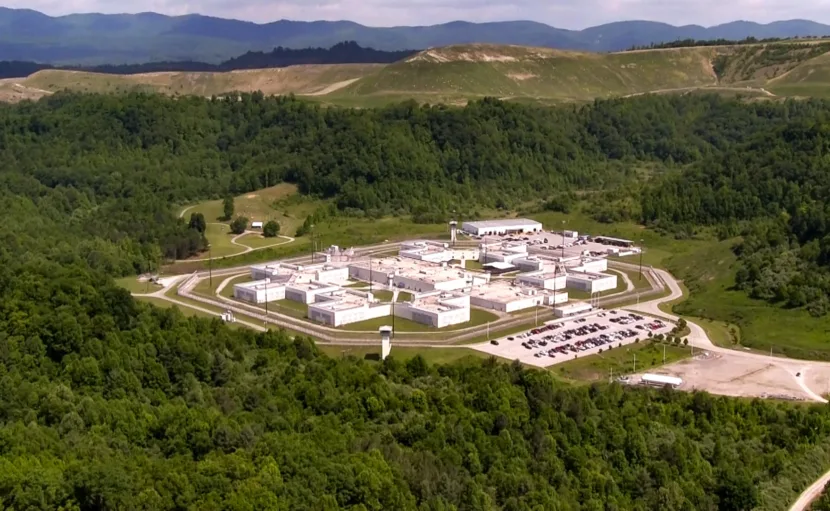After Self-Immolations at Red Onion Prison, Virginia Prisoners Allege Crackdown
At least six people at Red Onion intentionally lit themselves on fire last year. Now, prisoners say staff are forcing people to comply—or cutting their electricity.

Besides an overhead light, Sidney Bowman says he hasn’t had electricity in his cell at Virginia’s Red Onion State Prison for roughly three months.
Last month, Bowman told a federal court that prison employees cut the electricity to his cell after he refused to sign what staff call a “Safety Agreement for Inmates.” The document offers incentives to prisoners—such as movies, group recreation, free commissary bags, and a fish fry—provided they don’t harm themselves. However, if they repeatedly hurt themselves, they may lose “access to television, recreation time, or other amenities.” The Appeal obtained a copy of the agreement through a public records request.
Bowman’s statement is part of an ongoing class action lawsuit filed by the American Civil Liberties Union of Virginia that alleges that the state’s Step-Down program—which purports to help prisoners earn their way to a general population assignment—traps people in solitary confinement for months or years on end.
The legal team has asked the federal court to restore plaintiffs’ electricity and to prohibit staff from retaliating against people who refuse to sign the agreement or participate in the lawsuit. The Virginia Department of Corrections declined to answer The Appeal’s questions.
Last year, at least six people at Red Onion self-immolated in what incarcerated journalist Kevin ‘Rashid’ Johnson called “desperate attempts” to escape the prison’s inhumane conditions. But rather than offer them help, emails obtained by The Appeal show prison officials discussed how best to punish them. Then, in January, prison staff began distributing the Safety Agreement to people in Red Onion’s Step-Down program.
If someone refused to sign, staff cut the electricity to their cell’s outlet. The ACLU says this prevented prisoners from charging their tablets, watching television, or listening to the radio. Bowman told the court that he accesses religious programming through his television and tablet because he cannot leave his cell for services. He says his tablet is his primary tool to communicate with his family.
Red Onion’s assistant warden confirmed in a court statement that there have been nine self-burnings—eight last year and one in January. The assistant warden said no one had burned themselves with a power outlet since the prison distributed the agreement on Jan. 20.
“Security leadership and mental health leadership collaborated on potential solutions, and we ultimately decided that if an inmate agreed not to use the cell’s power outlet to bum himself, the power outlet in that inmate’s cell could remain active,” he said in his statement. “Inmates who refused to agree not to bum themselves would be placed in a cell where the power outlet had been deactivated.”
The warden said prisoners can use kiosks during recreation to charge their tablets and message family members. He said the prison has also set up TVs outside the cells to view religious services.
In addition to threatening to punish people for acts of self-harm, the agreement also requires signers to affirm that they have “access to mental health and other local resources.” The plaintiffs say compelling them to agree with or espouse statements they believe are untrue or objectionable violates their First Amendment rights.
The head of VADOC’s mental health services told the court that Red Onion “maintains a full staff of mental health professionals who are available 24-hours per day, 7 days per week.” However, Bowman says the prison provides no treatment other than medication.
“There is no therapy, no groups, no counseling, or any other kind of treatment for mental illness,” Bowman said in a sworn declaration included in the ACLU’s filing. “I do not believe that there is adequate mental health care here, and I did not want to sign an agreement saying I thought there was.”
In February, a VADOC spokesperson told The Appeal in an email that the agency had “turned off the electrical outlets (not the lights) in the cells of inmates who are deemed to be an immediate risk of self-harm and to permit the VADOC’s multi-disciplinary team the opportunity to further evaluate the mental health and wellness of those inmates.”
However, the ACLU says the state never conducted any such evaluations. The civil rights group says turning off the electricity has instead harmed their clients’ mental health. Prisoners in the Step-Down program are trapped in their cells for up to 20 hours a day.
“Since first bringing the safety agreement to me, no mental health staff has done any evaluation or assessment of my mental health,” Bowman said in his declaration. “This shows me that they are not really concerned about my mental health, but just want to punish me for not going along and signing the agreement.
